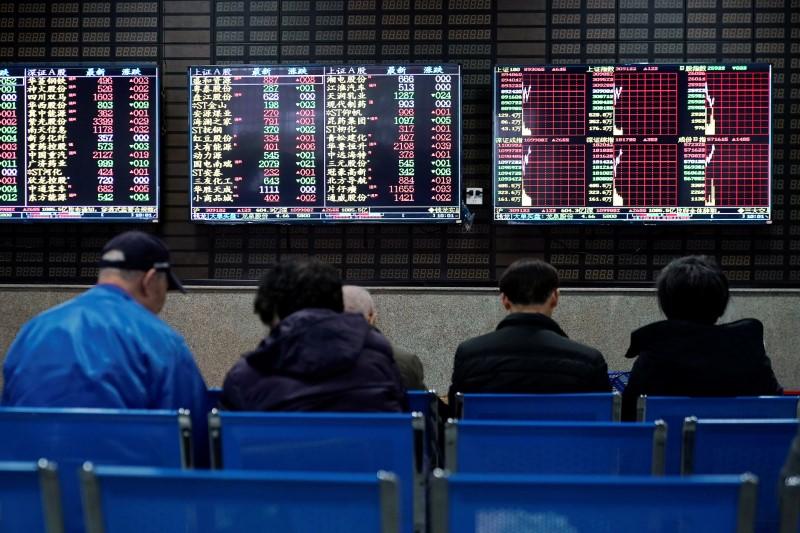Stocks, oil prices skid as China virus fears drive investors to safe havens
3 min read
TOKYO (Reuters) – Shares tumbled on Monday as investors grew increasingly anxious about the economic impact of China’s spreading virus outbreak, with demand spiking for safe-haven assets such as the Japanese yen and Treasury notes.Investors look at computer screens showing stock information at a brokerage house in Shanghai, China January 16, 2020. REUTERS/Aly Song
Japan’s Nikkei average .N225 slid 2.0%, the biggest one-day fall in five months, while a Tokyo-listed China proxy, ChinaAMC CSI 300 index ETF (1575.T), slid 2.2%. Amid the Lunar New Year holiday, many markets in Asia were closed.
U.S. S&P 500 mini futures ESc1 were last down 1.0%, having fallen 1.3% in early Asian trade.
European shares were expected to follow suit, with major European stock futures STXEc1FDXc1FFIc1 trading 1.2-1.4% lower.
“With most Asian markets closed, fast-money investors are buying risk-off hedges like Treasuries and selling the Nikkei,” said Masahiko Loo, portfolio manager at Alliance Bernstein.
“I think this would continue this week, until China markets resume trading next week and the coronavirus outbreak subsides.”
The ability of the coronavirus to spread is getting stronger and infections could continue to rise, China’s National Health Commission said on Sunday, with nearly 2,800 people globally infected and 81 in China killed by the disease.
China announced it will extend the week-long Lunar New Year holiday by three days to Feb. 2 and schools will return from their break later than usual. Chinese-ruled Hong Kong said it would ban entry to people who have visited Hubei province in the past 14 days.
Market participants kept a wary eye on developments around the virus, which the World Health Organization (WHO) last week deemed “an emergency in China,” but not, as yet, for the rest of the world.
MSCI’s broadest index of Asia-Pacific shares outside Japan .MIAPJ0000PUS was off 0.4%, although trade in the region has already slowed for the Lunar New Year and other holidays, with financial markets in China, Hong Kong, Taiwan, South Korea, Singapore and Australia closed on Monday.
All three major Wall Street indexes closed sharply lower on Friday, with the S&P 500 seeing its biggest one-day percentage drop in over three months.
The S&P 500 .SPX lost 0.9%, the Dow Jones Industrial Average .DJI fell 0.6% and the Nasdaq Composite .IXIC shed 0.9% after the Centers for Disease Control and Prevention confirmed a second case of the virus on U.S. soil.
U.S. Treasury prices advanced, pushing down yields further, with the benchmark 10-year notes US10YT=RR dropping to a 3-1/2-month trough of 1.627% in early Asian trade.
In the currency market, the concerns about the virus supported the yen, often perceived as a safe haven because of Japan’s net creditor status.
The Japanese currency strengthened as much as 0.5% to 108.73 yen per dollar JPY=, its 2-1/2-week high.
The euro EUR= last stood at $1.1028 versus the dollar, having fallen to its eight-week low of $1.1019 on Friday.
The offshore yuan CNH=D3 dropped more than 0.5% to 6.9776 against the dollar, its weakest level since Jan. 6.
The heightened fears of the economic impact of the coronavirus also pressured oil and other commodity prices, except safe-haven gold.
U.S. West Texas Intermediate (WTI) crude futures CLc1 plummeted 3.8% to hit a 3-1/2-month low of $52.15 in early trade. International benchmark Brent LCOc1 shed more than 3% to its three month low of $58.68 per barrel.
“Investors will react quickly to any sign of negativity and this is no exception as China announces that the issue has become an emergency. This could keep oil prices fragile until the coronavirus shows signs of slowing down,” said Mihir Kapadia, chief executive at Sun Global Investments.
Spot gold XAU= rose as much as 1.0% to $1,585.80 per ounce, the highest level since Jan. 8, as rising concerns over the spread of a virus outbreak in China and its potential economic impact prompted investors to buy the safe-haven metal.
Reuters!





